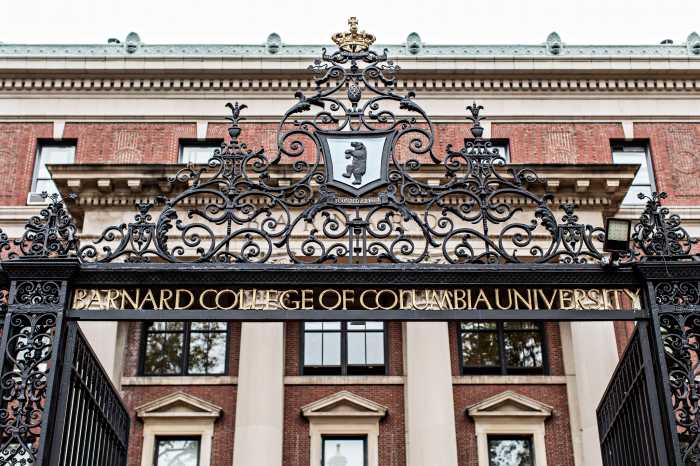You usually smell or hear them before you see them.
You can catch the meat odor their carts emanate or hear them advertising handbags and other items on many of New York City’s streets.
Recently, the City Council has renewed its fiery debate centered around how it should handle these street vendors - many of whom line the city streets legally and illegally - and deal with the tension that often arises between the street vendors and area store owners.
“To have somebody come in with merchandise and set up a table in front of your store and undercut your prices - it’s a difficult thing to deal with,” said Ernesto Cury, president of the Board of Directors of the 82nd Street Business Improvement District (BID), an economic development organization representing about 180 businesses in Elmhurst and Jackson Heights.
“At all of our meetings, it’s one of our major problems - how to deal with that,” Cury explained.
He said that within his BID, which stretches along 82nd Street, between Baxter and 37th Avenues, there are about 12 vendors per day between Monday and Saturday, and many of them are unlicensed.
On Sundays, when the law does not restrict the number of vendors that can sell in the BID, the streets are packed with vendors selling food and general goods, according to Cury. This problem is representative of other BIDs too, he added
“They [merchants] are furious. They are like, ‘why are we paying taxes?’ ” said a source from the 82nd Street BID who wished to remain anonymous. In addition to rent and other taxes, the merchants pay a special tax just to be part of the BIDs.
“We appreciate the fact that people [street vendors] need to make a living, but they shouldn’t do it through unfair competition,” said Chuck Hunt, executive vice president of the New York State Restaurant Association.
However, supporters of street vendors believe that the vending can help create more jobs and want the city to increase the number of licenses it issues each year.
“In a free market economy, why not?” said Rafael Samanez, executive director of VAMOS Unidos, an organization that represents about 300 street vendors from all over New York City.
“Business owners pay more taxes, but they have more merchandise, so they can make more money,” Samanez said. “Vendors operate from one-twentieth the size of a business. You can’t compare a business to a street vendor.”
Meanwhile, selling on the streets is often the only way to make a living for many illegal immigrants, said Piedad Cano, 64, a street vendor in Jackson Heights. Cano sells Latino favorites such as arepas (thin, round corn cakes) and chicharrn (pork rind) out of her cart at Roosevelt Avenue and 80th Street.
With the economy on the decline and unemployment rising, even more immigrants will be forced to look to vending, according to Cano, who came to the U.S. from Colombia about 20 years ago.
“I was a lawyer in my country, and I didn’t have another choice when I came here than to become a street vendor. I came with my kids, so I was the only support for them,” she said.
Cano said she makes between $200 and $300 per week, depending on circumstances.
“When it’s snowing or raining we can’t work for many days, sometimes a whole week,” Cano explained, adding that the police can also pose a problem.
“Once I couldn’t work for a whole week because the NYPD was around me and didn’t let me work because I didn’t have a license,” recalled Cano, who now has a license.
The city’s annual cap on licenses for general merchandise vendors is 853 and 4,100 for food vendors, explained Tali Aronsky, director of communications and marketing at the Department of Consumer Affairs. These caps, which have been in place for 30 years, do not apply to veterans and First Amendment vendors, who sell things like newspapers and art.
However, the number of unlicensed vendors throughout the city is estimated to be about 10,000, said Samanez, of VAMOS Unidos.
He explained that his organization supports legislation that calls for increasing the number of licenses from 4,100 to 25,000 for food vendors and from 853 to 15,000 for general merchandise vendors.
Brooklyn City Councilmember Charles Barron introduced this legislation in 2006, and legislators discussed this bill along with seven others pieces of vendor legislation at a November City Council hearing.
Increasing the number of licenses would protect vendors from being fined, arrested and having their goods confiscated, and it would allow the unlicensed vendors to work within the law, said Samanez.
In addition, it would create more jobs and could bring in an estimated $3.2 million to the city’s budget every year, Samanez added.
Cury, of the 82nd Street BID, agreed that vending can provide additional jobs. He said that increasing the number of licenses is not a bad idea as long as it is strictly defined where exactly vendors can work.
“To allow increasing the licensing without redefining where they can operate will only increase the problems that we have,” Cury said.
































